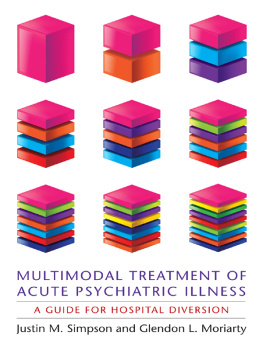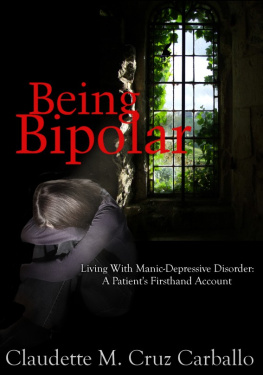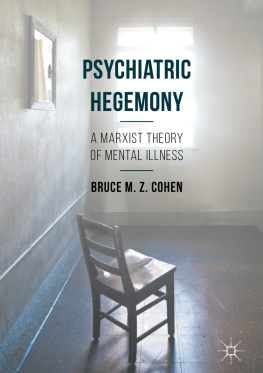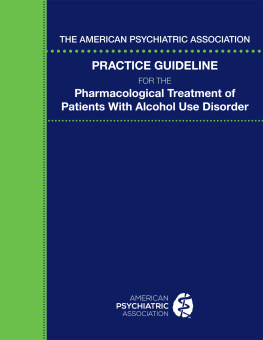MULTIMODAL TREATMENT OF ACUTE PSYCHIATRIC ILLNESS
Multimodal
Treatment
of Acute
Psychiatric
Illness
A GUIDE FOR HOSPITAL DIVERSION
Justin M. Simpson and Glendon L. Moriarty
COLUMBIA UNIVERSITY PRESS NEW YORK
COLUMBIA UNIVERSITY PRESS
Publishers Since 1893
New York Chichester, West Sussex
cup.columbia.edu
Copyright 2014 Columbia University Press
All rights reserved
E-ISBN 978-0-231-53609-7
Library of Congress Cataloging-in-Publication Data
Simpson, Justin M.
Multimodal treatment of acute psychiatric illness : a guide for hospital diversion /
Justin M. Simpson, Glendon L. Moriarity.
p. ; cm.
Includes bibliographical references and index.
ISBN 978-0-231-15882-4 (cloth : alk. paper) ISBN 978-0-231-15883-1 (pbk. : alk. paper)
ISBN 978-0-231-53609-7 (ebook)
I. Moriarty, Glendon. II. Title.
[DNLM: 1. Mental Disorderstherapy. 2. Acute Diseasetherapy.
3. Community Mental Health Services. 4. Crisis Intervention. WM 400]
RC455
RC480.6dc23 2013016128
A Columbia University Press E-book.
CUP would be pleased to hear about your reading experience with this e-book at .
Cover design by Milenda Nan Ok Lee
Cover art Getty Images
References to websites (URLs) were accurate at the time of writing.
Neither the author nor Columbia University Press is responsible for URLs
that may have expired or changed since the manuscript was prepared.
TO THE MANY PEOPLE ON THE PATH TO RECOVERY FROM MENTAL ILLNESS,
AND TO THOSE WHO WISH TO HELP THEM ON THEIR JOURNEY
CONTENTS
A 43-YEAR-OLD WOMAN with a history of bipolar disorder and multiple episodes of inpatient treatment has recently experienced an increase in the severity of her symptoms. Her mood is unstable, and she reports feeling out of control. Recent financial difficulties have caused intense feelings of despair accompanied by thoughts that life is not worth living. She has had some success with medication, but nothing has controlled her symptoms for a substantial period of time. Her husband is discouraged because of the frequent trips to the hospital, continuous contact with emergency services and law enforcement, and constant worry that his wife is going to hurt either herself or someone else. She recently began participating in an assertive community treatment program, and her treatment team knows that if they do not effectively stabilize her, she will have to return to the hospital yet again, even though neither she nor her family wants this.
DILEMMA
The number of Americans with severe mental illness is estimated to be 6 percent of the population. When applied to the 2010 U.S. Census population estimate for ages 18 and older, this figure translates to approximately fourteen million people (U.S. Census Bureau, 2011a). Many of these individuals require periodic inpatient treatment to achieve mental health stability and to function normally. Unfortunately, being displaced from the community even for a short period of time might result in the loss of employment, housing, social supports, and other important aspects of life.
Hospitalization is not the only option for individuals with severe mental illness who experience episodes of psychiatric instability. Community-based alternatives to inpatient care have been available for decades. There are a variety of hospital diversion programs currently available around the country. These programs, including assertive community treatment (ACT), mobile crisis home treatment (MCHT), crisis stabilization, and partial hospitalization are preferred by consumers and are generally more cost effective than inpatient psychiatric care (Ruggeri et al., 2006; Ligon & Thyer, 2000; Granello, Granello, & Lee, 1999; Essock, Frisman, & Kontos, 1998).
Hospital diversion programs are assigned the task of helping individuals, such as the woman described above, manage their symptoms and cope with adversity in the least restrictive environment. However, inpatient treatment is often unnecessarily the first choice in the effort to stabilize a person experiencing an acute phase of his or her particular illness. In many cases inpatient hospitalization occurs because the service providers working within hospital diversion programs have not been trained in helping clients who are decompensating or in crisis (Hunter et al., 2009; Young et al., 2000; Chinman et al., 1999).
There has been a push by government bodies, consumer advocacy groups, and managed care agencies to decrease state psychiatric hospital beds around the country over the past decade (Lipton, 2001), even though the need for those beds remains high. For instance, in Virginiaa state that has shut down psychiatric hospitals and continues to reduce beds in existing onesrecently passed legislation that makes even more people eligible for involuntary commitment to a psychiatric hospital (Virginia DMHMRSAS, 2008). The predicament is obvious; there are fewer hospital beds and more people who will require a bed. As a solution, Virginia is creating more community-based programs, such as assertive community treatment and crisis stabilization, to support individuals in an acute stage of mental illness. Workers within these programs need to develop competency in acute psychiatric care in order to best help consumers.
OVERVIEW
This book offers readers both a conceptual framework and a practical guide for providing brief stabilizing mental health treatment to individuals with severe mental illness. The initial chapters present a theoretical and structural base from which the reader can implement treatment strategies. This section of the text includes an overview of hospital diversion programs, integrated and multimodal treatment, the treatment of severe mental illness, and brief and crisis intervention.
The practical component of the text consists of an integrated and systematic set of interventions that are designed to bring psychiatric stabilization to individuals with severe mental illness (i.e., those with schizophrenia or schizoaffective disorder, bipolar or major depressive disorder, severe anxiety, or substance dependence) who are experiencing mental health decompensation, an emotional or psychological crisis, relapse of substance use, or a mood or psychotic episode. Within a guiding framework, consisting of four intervention phases, specific treatment strategies tailored to certain diagnoses are provided in a step-by-step manner. The treatment approach is considered integrative and multimodal because it includes several empirically supported therapeutic tools that are derived from various clinical orientations and targets multiple aspects of the clients life.
Acute psychiatric illness is the phrase used in the title of this text to describe the condition for which the treatment protocols are targeted. Other terms that have a similar meaning include mental health decompensation, psychological crisis, behavior crisis, and psychotic, anxiety, or mood episode. For the purposes of this book, acute psychiatric illness can be defined as a period in which a persons ability to cope with various stressors or natural condition-related symptom fluctuations has been unsuccessful and the result includes significant impairment in daily functioning, severe emotional disturbance, or behavioral problems.
THE UNIQUE BENEFITS OF THIS BOOK
Because it is not feasible to rely on hospitalization for severely mentally ill individuals who decompensate, the interventions that are offered in the hospital have to be provided by service providers involved in community-based programs. This book helps to bridge the gap between the clinical resources that are used in the psychiatric hospital and other psychiatric or psychological settings and the community-based programs that are often more oriented toward case management. The book can assist crisis stabilization, assertive community treatment, and other acute care program staff in forming accurate conceptualizations, developing appropriate treatment plans, and providing effective interventions for clients served.










